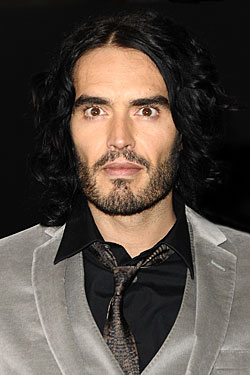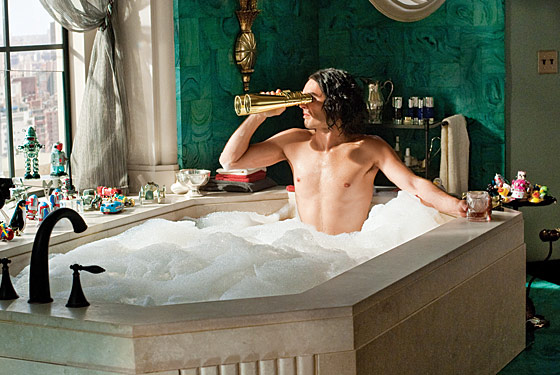
It’s impossible to miss Russell Brand, even in a shadowy corner of the packed library lounge of the Greenwich Hotel. Not that he would want you to. The Captain Jack Sparrow look-alike is wearing black pointy fruit boots, more rings than a sultan, and an enormous, asymmetrical animal-skin coat that looks like something a caveman might carve off a mastodon. “Let’s make it a double!” Brand shouts at the waitress, flicking away tendrils of frizzy hair and batting mascara-splattered saucer eyes. “Let’s get wild! Doubles for both of us!”
You would be forgiven for assuming the doubles are Scotch or tequila. Brand has done little to soften the potent persona he unleashed doing British stand-up, followed by breakout supporting roles in the films Forgetting Sarah Marshall and Get Him to the Greek: a prancing, lascivious, drink-and-drugs-addled, motormouth monologuist. (Or, as he describes it, a “spiky, lacquered, Jack Frost sex sprite.”) And now he’s a movie star, voicing a randy rabbit in Hop, and playing film’s most beloved drunk in a remake of the 1981 romantic comedy Arthur (opening April 8). Thing is, Brand—who has just returned from visiting his pop-star wife, Katy Perry, on the German leg of her international tour—has been sober for eight years. The doubles are espresso.
He looks at a half-empty bottle of Pellegrino left on our table. “How about that bottle of water? Were you tempted to drink it?” He arches an eyebrow so high he could pitch a tent with it; it’s as if he’d suggested we snort the ground-up ashes of Mother Teresa. “Should we? Eh?”
Brand, you realize, is never not on. “You watch him do stand-up or in a film, and it’s like he’s reading words off a screen in his mind,” says his Arthur co-star Greta Gerwig. “He’s like that in real life, too. He can’t help it. It’s almost reflexive artistry.”
A few shocking revelations from Brand’s memoirs, 2007’s My Booky Wook and 2010’s Booky Wook 2: He was molested at age 7, and his mother had three bouts of cancer before he turned 21. When he was 16, his father took him to Bangkok and brought three prostitutes back to their hotel room: two girls for Pops, one for the kid. A self-described “bit of a chubby nitwit” from Essex, he worked his way through drama classes, bawdy radio shows, sleazy stand-up routines, and spectacularly risqué cable-TV specials. On his raw-nerved, short-lived TV show RE:Brand, he gave himself challenges like “Wank off a man in a toilet when you’re not gay” and followed through on them.
Brand has been fired multiple times, from radio and TV shows and a film, for doing too many drugs, for belligerence, for describing anal sex over the air on a Sunday afternoon, and, most famously, for calling up comic actor Andrew Sachs and leaving a message boasting that he’d buggered the 78-year-old man’s granddaughter. After he was dismissed from a TV show, a friend gave him a gift inscribed SORRY I TOLD YOUR BOSS THAT YOU’RE A HEROIN ADDICT.
Just as when Peter Parker was bitten by a radioactive spider, Brand says there was a blinding moment that changed everything. In 2006, after his breakthrough stint as commentator on Britain’s Big Brother, he slept with Kate Moss. Somehow that event emboldened him to develop “an organic construction sufficiently macabre to contend with the chemical warfare of modern fame.” In his memoir he wrote, “This monster bore my name [but] he did not resemble the delicate schoolboy that preceded him.”
Success swiftly followed. At first, Brand says, he thought fame had given him “a forum through which I could communicate spiritual truths to change the world!” Now he acknowledges that it can be “very, very difficult to overwhelm the preexisting narrative paradigm.” That paradigm being that he became known less for his improvisatory, lightning-fast comedy than for being a fop and a cad. “People say, ‘He’s a crack addict! He’s a bad boy who finally found love with pop sensation Katy Perry,’” says Brand. “Well, there’s more! I’ve been a vegetarian since I was 14, I was bulimic, I self-harmed as a teenager. I was an isolated, lonely boy.”
And yet he’s entirely aware that he is the creator of his own myth: “I am my own tabloid newspaper. I’ve recognized which bits are convenient, eliminated the others … No one wants to hear the sad man, crying into tinfoil, listening to the Verve. So I’d say, ‘Yeah, I was a junkie wild man always in trouble with the police,’ because I recognized, ‘Oh, that’s what they want.’ So now I suppose it’s ungracious and certainly disingenuous to go and take my ball back.”

At 35, Brand is in the odd position of either evolving his self-described monstrous persona into a healthier, more enlightened version or reconciling himself to faking it. Arthur co-star Helen Mirren recognizes the dilemma. “It’s hard to be an original in this world, which Russell is. And when you’re young, you do that kind of shit. If you’re lucky, you grow out of it.” (Of Mirren, Brand says, “To have known her at a time where [romance] would have been feasible outside of marriages—it would have been very exciting.”) There’s also the more poignant possibility that Brand’s outrageous self-caricature is too specific for a lengthy career, at least one as a movie star.
A waitress walks by and asks Brand if he needs anything. “Oh, God,” he gasps, leaning in and focusing all his attention on her. “It’d be a terrible list if we were to start with my actual requirements. Besides, I think, we would need the U.N. involved. Some sort of tent out there with respiratory equipment? A masseuse. People with oils. Some sort of, like, guy with a harp or a lyre.”
The waitress smiles, blushing deeply, and I’m reminded of something Gerwig said. “When Russell paid attention to you, the sun was shining on you and it was so warm and good. And then he’d take it away and you’d just want it back again. Which is why I’ve always said he could be a cult or religious leader. Everyone was in love with him—men and women.”
In Arthur, directed by Jason Winer (Modern Family), Gerwig steps into the Liza Minnelli role as the sincere young woman who saves the rich and feckless hero. Mirren plays his wry, indulgent nanny (John Gielgud in the original). “Because of what I bring,” says Brand of his character, “we deliberately toned down anything that was too much about hedonism and women and focused on man-child stuff.”
Perhaps the biggest change is that (minor spoiler alert) rather than ending the film with Arthur still a falling-down drunk, 2011 Arthur goes to AA, only getting the girl after learning to take care of himself. Brand attends meetings regularly and similarly got his girl after behavior modification—switching to a life “not built on things that are very transient and explosive. As soon as I met Katy, I realized instantly, in this preposterously romantic way, that this is only going to work if I completely alter my agenda,” says Brand, who fell for his wife after she threw a water bottle at his head at rehearsals for the 2009 MTV Video Music Awards. That night, while presenting, he hit on Perry from the stage. They were engaged three months later and married in a Hindu ceremony this past October.
It’s hard to imagine Brand or Perry lounging around, stripped of elaborate makeup and costumes, evaluating window treatments on their laptop, but this, says Brand, is how they spend a Sunday afternoon. “‘Those curtains?’ Well, I don’t know, that seems like a lot of money. ‘Yeah, but if you think about it, they’ll be there for five years.’ To quote Lemmy from Motörhead, ‘I’ve never had one woman that made me want to give up all the others.’”
See Also:
A Few Extra Riffs From
Russell Brand